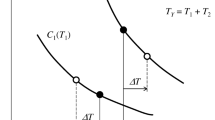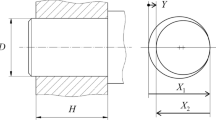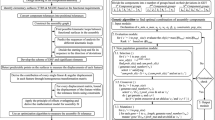Abstract
Selective assembly can enlarge the tolerances of mechanical components for easier manufacturing. However, the non-independent dimensions of correlated components make it difficult to optimise tolerance allocation for an assembly. This paper proposes a solution for this constrained optimisation problem consisting of tolerances and non-independent dimensions as design variables. The approach is to develop a simplified algorithm applying a Lagrange multiplier method to evaluate the optimal tolerances efficiently. The solution is shown to be a global optimum at the given correlation coefficients. The correlation coefficients are key elements in determining the optimal solution, which is demonstrated in the given examples. The results are helpful in designing tolerances for selective assembly.
Similar content being viewed by others
Abbreviations
- A j :
-
coefficient matrix off j
- B i :
-
coefficient of cost function
- C :
-
total manufacturing cost function
- C i :
-
manufacturing cost function forx i
- F j :
-
thejth dimensional constraint function
- f j :
-
thejth quadratic constraint function
- f :
-
quadratic constraint vector
- H j :
-
thejth Hessian matrix
- J kj :
-
element ofn×m Jacobian matrix
- L :
-
Lagrangian
- m :
-
number of assembly dimensions
- n :
-
number of component dimensions
- p :
-
number of equality dimensional constraints
- T :
-
tolerance vector of component dimensions [mm] or [°]
- \(T_{x_i } \) :
-
tolerance ofx i [mm] or [°]
- \(T_{Z_j } \) :
-
tolerance ofZ j [mm] or [°]
- x :
-
component dimension vector
- x :
-
midpoint vector
- x i :
-
component dimension [mm] or [°]
- x i :
-
midpoint ofx i [mm] or [°]
- Z j :
-
assembly dimension [mm] or [°]
- β j :
-
confidence coefficient forZ j
- γ i :
-
confidence coefficient forx i>
- δ j :
-
given design value ofZ j [mm] or [°]
- λ :
-
Lagrange multiplier vector
- λ j :
-
thejth Lagrange multiplier
- λ*:
-
Lagrange multiplier vector at the optimum solution
- \(\rho _{x_i x_k } \) :
-
correlation coefficient forx i andx k
- σ x :
-
standard deviation vector
- σ * x :
-
standard deviation vector at the optimum solution
- σ 0 x :
-
candidate point satisfying the constraintsf(σ * x )=0
- \(\sigma _{x_i } \) :
-
standard deviation ofx i
References
F. H. Speckhart, “Calculation of tolerance based on a minimum cost approach”,Journal of Engineering for Industry, ASME 94(2), pp. 447–453, 1992.
M. F. Spotts, “Allocation of tolerances to minimize cost of assembly”,Journal of Engineering for Industry, ASME 95(3), pp. 762–764, 1973.
W. Michael and J. N. Siddall, “The optimal tolerance assignment with less than full acceptance”,Journal of Mechanical Design, ASME 104(3), pp. 855–860, 1982.
Z. Wu, W. H. Elmaraghy and H. A. Elmaraghy, “Evaluation of cost-tolerance algorithms for design tolerance analysis and synthesis”,Manufacturing Review 1(3), pp. 168–179, 1988.
P. F. Ostwald and J. Huang, “A method for optimal tolerance selection”,Journal of Engineering for Industry, ASME 99(3), pp. 558–565, 1977.
W. J. Lee and T. C. Woo, “Tolerances: their analysis and synthesis”,Journal of Engineering for Industry, ASME 112(2), pp. 113–121, 1990.
Z. Dong and A. Soom, “Automated optimal tolerance design for related dimension chains”,Manufacturing Review 3(4), pp. 262–271, 1990.
C. Zhang and H. P. Wang, “The discrete tolerance optimization problem”,Manufacturing Review 6(1), pp. 60–71, 1993.
T. L. Dresner and P. Barkan, “Optimal tolerance allocation for tolerance stack-ups”,ASME, DE-vol. 65-2, pp. 167–174, 1993.
M. S. Chen, “Optimizing tolerance allocation for a mechanical assembly with nonlinear multiple constraints”,Journal of the Chinese Society of Mechanical Engineers, CSME 16(4), pp. 349–361, 1995.
K. W. Chase, W. H. Greenwood, B. G. Loosli and L. F. Hauglund, “Least cost tolerance allocation for mechanical assembly with automated process selection”,Manufacturing Review 3(2), pp. 49–59, 1990.
D. B. Parkinson, “Assessment and optimization of dimensional tolerances”,Computer-Aided Design 17(4), pp. 191–199, 1985.
Author information
Authors and Affiliations
Rights and permissions
About this article
Cite this article
Chen, MS. Optimising tolerance allocation for mechanical components correlated by selective assembly. Int J Adv Manuf Technol 12, 349–355 (1996). https://doi.org/10.1007/BF01179810
Issue Date:
DOI: https://doi.org/10.1007/BF01179810




